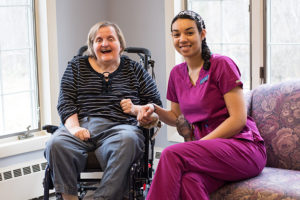If you’ve been following our blog recently, you probably know that we’re in full conference swing. You may have also noticed that LeadingAge has a theme this year with their state annual meetings: Life on Purpose. LeadingAge Massachusetts is no different. From scenario planning to intergenerational living, I’d like to share with you some of the ways the members and the presenters at this year’s conference are bringing purpose to the people of their communities or living their own “life on purpose.”
2030 Aging Services: Scenario Planning
First, LeadingAge President and CEO, Katie Smith Sloan, kicked off the Annual LeadingAge Massachusetts Conference with a Q&A on what’s happening at a national level for the organization. She outlined the 2030 Aging Service Scenario Planning, a white paper provided to LeadingAge members. It provides a report and goal-planning tools for the future of not-for-profit senior living. There are four scenarios:
- Bills Come Due: Aging and Unprepared
- Troubled Times: Economic and Social Regression
- A Bright Horizon: Mindful and Connected Aging
- A Thriving System: Technology Abounds
The full white paper can be found on the LeadingAge website, which details the four scenarios and questions to consider in preparation for what’s to come by the year 2030.
“The future is not going to look anything like the present.” — Katie Smith Sloan
LeadingAge Massachusetts: What Matters Most
A big highlight of the LeadingAge Massachusetts conference was not just about what we can do to prepare for the future, but also what communities should be doing now to provide the opportunities for its residents to live a “life on purpose.” That was particularly apparent in the session around person-centered care.
It’s quite a buzz word around the industry these days to focus on being person-centered. But what does that mean? And what are communities doing about it?
Three representatives from different organizations talked about what they are currently doing to support the Massachusetts Coalition for Serious Illness Care. This includes having everyone — residents, staff and family members — aligned and providing health care that honors the individual’s goals, values and preferences.
The common thread throughout all the community examples was “What Matters Most.” It’s a simple, but powerful concept: Asking what is important to families and their loved one and making a plan around whatever the answer is. This planning allows is for more open communication and fewer uncomfortable conversations.
Intergenerational Living — A Case Study
Another hot topic is providing intergenerational living opportunities within communities. Whether it’s visits from the local schools or events that enable children or teens to interact with community residents, many CCRCs have found intergenerational programs enhance the lives of residents and visitors alike.
St. Joseph’s Rehabilitation and Residence in Portland, Maine, has brought it to a whole new level. Starting in January 2017, they took an old assisted living wing that was no longer in operation and converted it into housing for local students. They currently have 13 certified nursing assistants living with the residents. Their program was based on the Humanitas program in the Netherlands as well as Judson Senior Living in Cleveland, Ohio. St Joseph’s is just the third organization in the world to have younger and older adults living under one roof!

For communities considering starting their own intergenerational living programs, tips included:
- Screening students in the same way as employees
- Banning toasters (you can probably guess why)
- Offering a meal plan
- Establishing a clear policy and code of conduct for students (St. Joseph’s Sample Code of Conduct)
The Voices of Individuals Living with Dementia
One of the most powerful parts of the day was the closing session. A representative from the Massachusetts chapter of the Alzheimer’s Association and three people diagnosed with early-onset dementia spoke. They provided an enlightening peek into a day in their lives.
Ranging in age from late-40s to early 50s, the panelists talked about what the signs were, their diagnosis, the challenges they face. They also talked about what we as members can be doing to help, such as helping residents stay engaged socially.
“The first prescription that should be written for people after getting a diagnosis of dementia should be social engagement.” — Mike (panelist)
Were you at the LeadingAge Massachusetts conference last week? Did you attend any other sessions not highlighted here? Let us know, we’d love to hear from you.
For the latest mature marketing insights and to continue to follow us on the conference trail, subscribe to our enewsletter.



